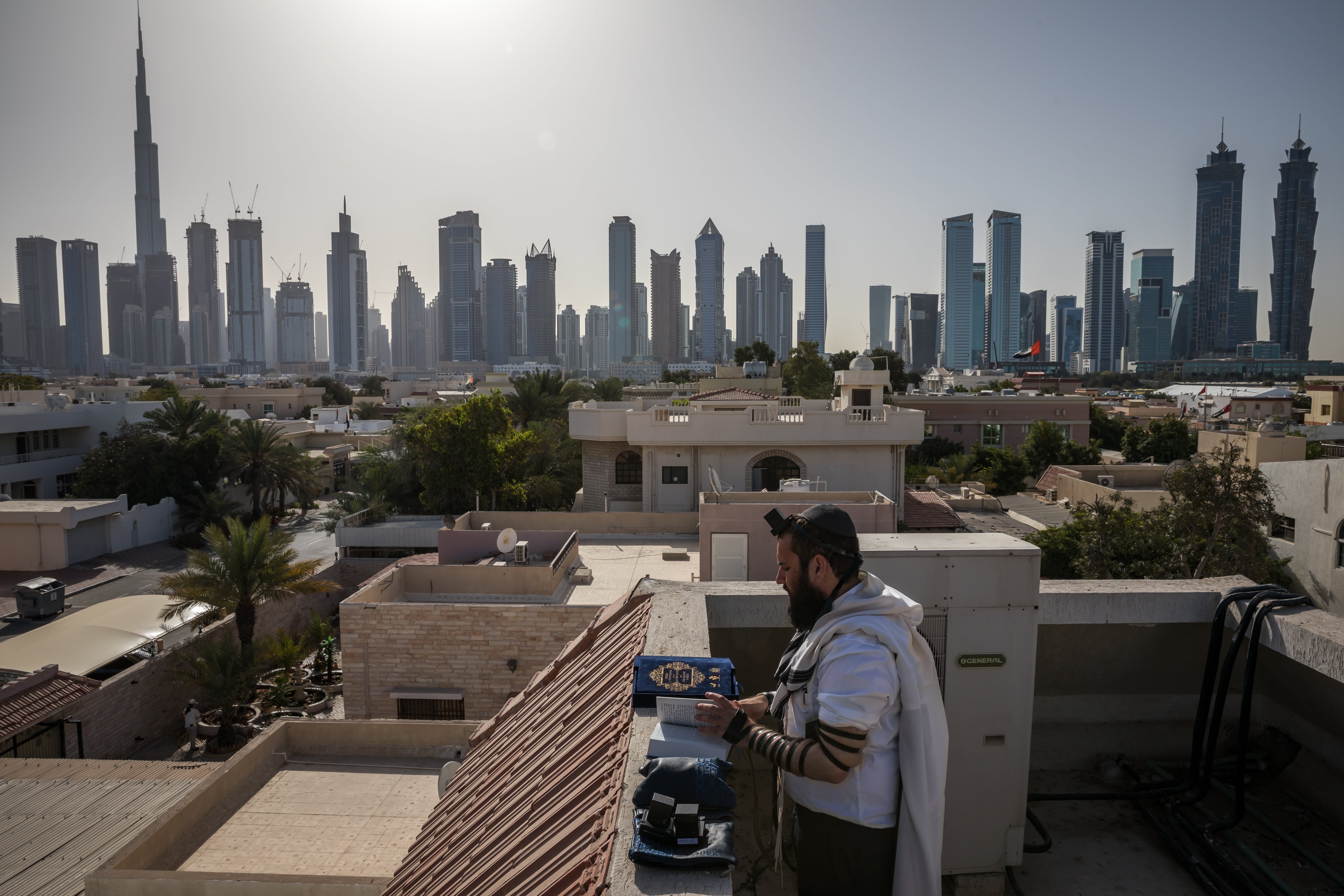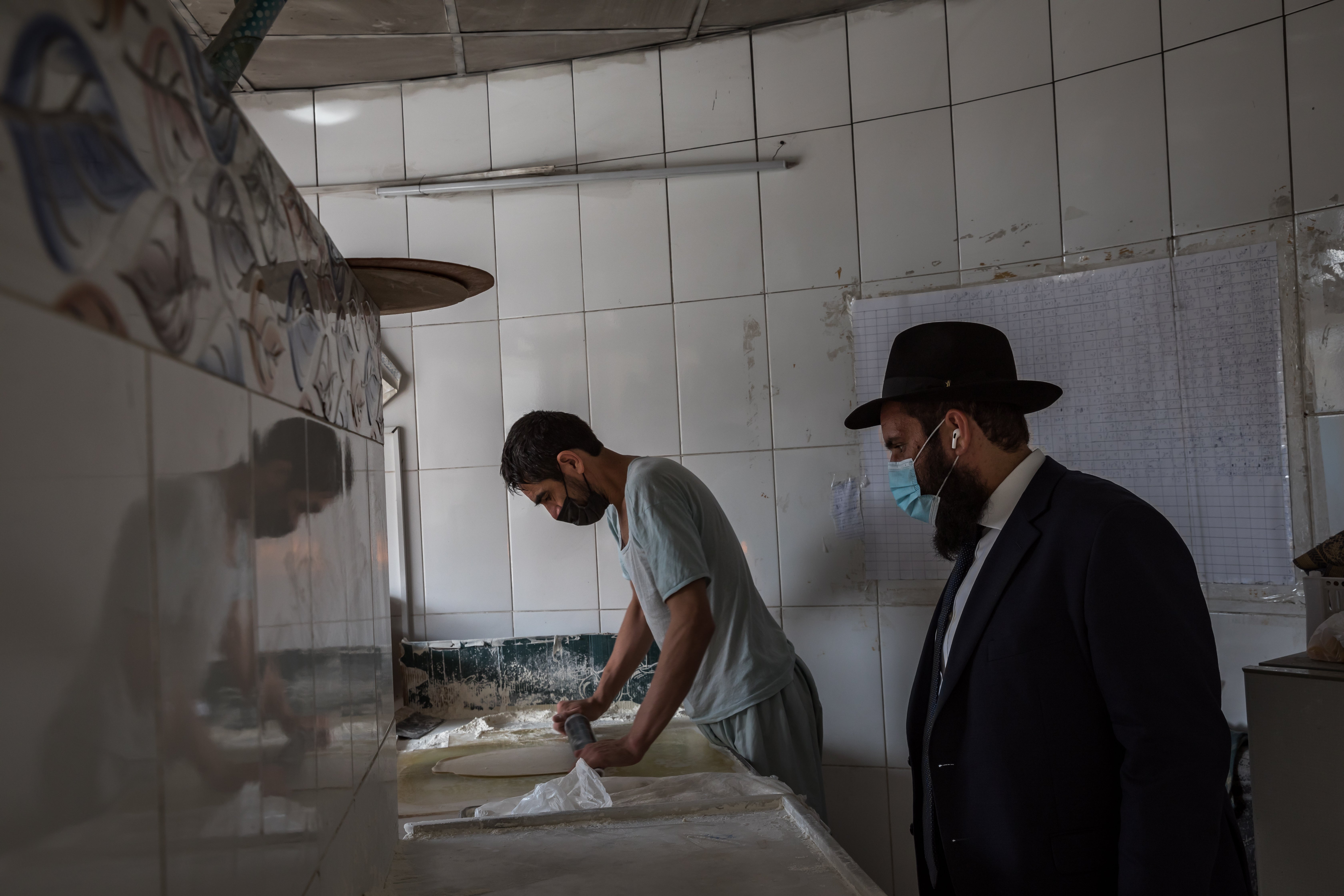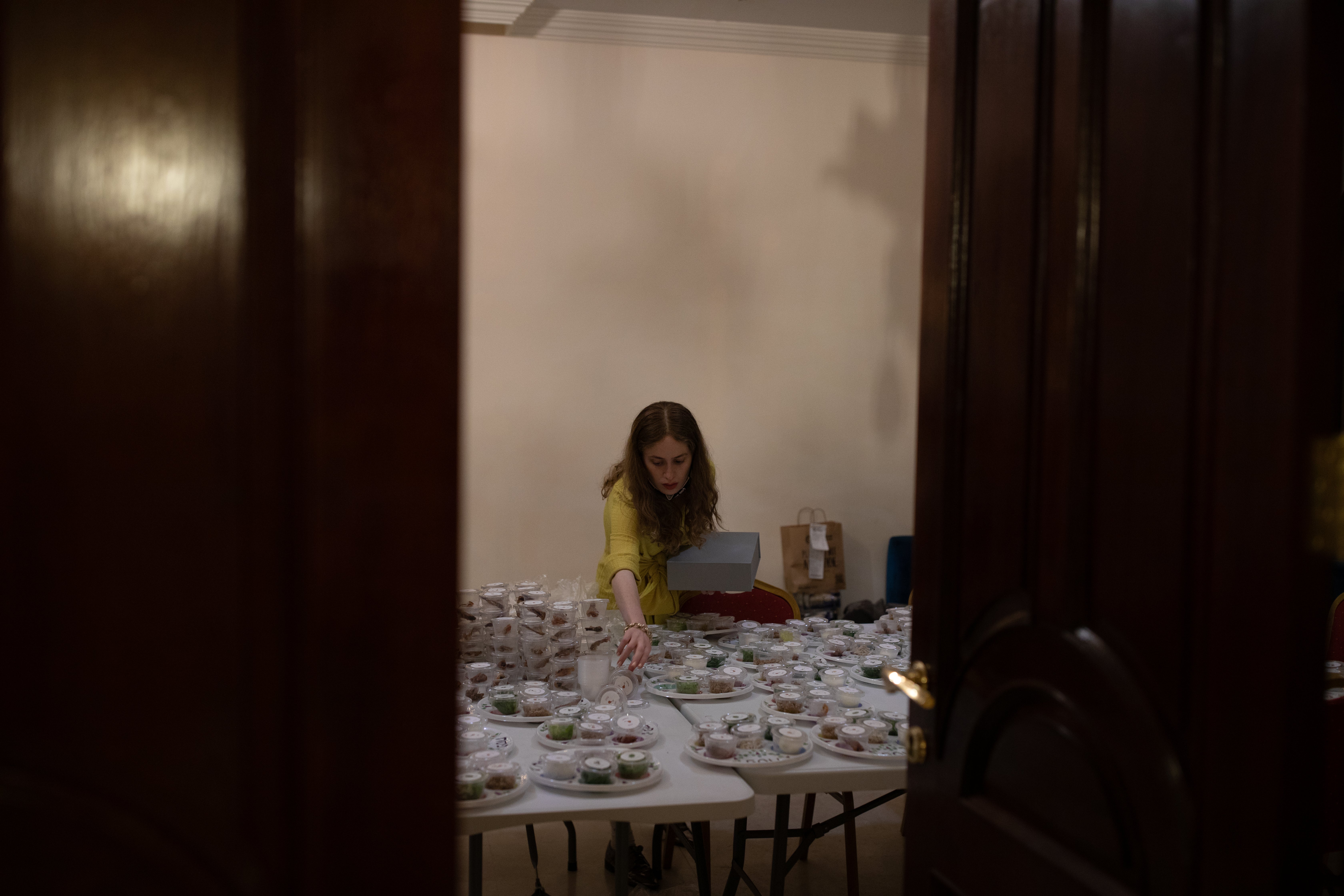Out of the shadows: UAE’s Jewish community thrives after political agreement
The normalisation of relations between the UAE and Israel is having a marked impact on the lives of ordinary people, reports Bel Trew in Dubai


For the French-Moroccan-American couple, Dubai was among the last places they would have imagined picking for their Orthodox Jewish marriage ceremony which took place two weeks ago.
Despite being a long-term favourite for luxury weddings and winter breaks, the UAE has not been an easy place for observant-Jewish visitors.
Until recently the 1,000 or so members of the resident Jewish community had kept a low profile. Despite there being at least 45 official churches servicing the 800,000-strong Christian community in the UAE, there is still no permanent synagogue in any of the Emirates. Kosher food options used to be so non-existent that long-term visitors to Dubai described bringing their own cling-film wrapped kosher supplies, and even pots and pans, with them.
Alex, the French-Moroccan groom, studied in the UAE a decade ago, and says that in those days he actually hid that he was a practising Jew, fearing it wouldn’t be safe.
But times have changed. Over the last few months there has been a surge in international Jewish tourism to the Emirates, and with it a rise in kosher businesses: one of the side effects of a divisive diplomatic deal between the UAE and Israel in August. The Jewish wedding and holiday industries have boomed, particularly with Passover this week.
Read more:
“Honestly 10 years ago we couldn’t have thought of having our wedding in the UAE. It would have been Europe or Israel, or because of [the bride] Hannah, the US,” Alex tells The Independent.
That all changed when the couple had to cancel their wedding in France at the last minute because of the coronavirus lockdown.
It turned out that Dubai, which remained open to tourists, was pretty much the only place on earth where they could have an Orthodox ceremony that their geographically scattered family could physically attend.
“It was seamless,” says bride Hannah, who is American, describing the surprising number of options they had.
“All the hotels were offering kosher [services]. They were all really excited to have our wedding there, they really wanted to enter the Jewish wedding industry.”
The couple describe it as a unique multicultural experience. Their wedding planner was Palestinian. Rabbi Elie Abadie, who officiated, is originally from Lebanon and is now a senior resident rabbi in the UAE.
Moments after the couple were married next to the beach, the Islamic call to prayer sounded.
Rabbi Abadie, whose own son is planning on getting married in Dubai, says there are several more Jewish ceremonies in the pipeline as hotels and wedding planners have realised the potential of this new market.

“There is a sea change right now,” he tells The Independent.
“It’s not just weddings. For Passover this week, Jewish tourists are here celebrating.”
He says that kosher options aside, Jewish residents and visitors feel safe, a view expressed by others The Independent spoke to.
“I walk with my kippah; I don’t look back, not even for a second. I feel very safe and protected,” he adds.
It is a far cry from 25 years ago when being openly Jewish in the UAE would not have been welcome. In 1999, a British university came under fire after it was accused of banning Jewish authors to protect its franchises in the Emirates because of local laws.
At the time, the University of Lincolnshire and Humberside confirmed that books by Jewish authors and those with bibliographies mentioning Jews were banned by its affiliates in the UAE.
The British Council also sparked uproar when back in 1999 it admitted it tolerated the Emirati censorship of Jewish works, in accordance with “local political, religious or moral publishing laws”.
While those attitudes and restrictions have changed over the years, there has been a massive shift recently. The catalyst of the recent change is undoubtedly the controversial diplomatic deal between the UAE and Israel, which was signed in August.
The so-called Abraham Accords marked the first time Gulf countries had formally recognised Israel, which they had not done in the past because of regional stances on the seven-decade Israeli-Palestinian conflict.
It has meant that Israel and the UAE have exchanged ambassadors and opened diplomatic and trade relations. There are now direct flights between the countries, and plans for security, telecommunications, energy and healthcare ties.
But the deal has not been without controversy.
It was vehemently rejected by the Palestinian leadership, whose members were unusually united in their condemnation of the deal, which they called a “stab in the back” and “betrayal” as it came without an agreed Palestinian-Israeli peace agreement grounded on a two-state solution.
Palestinian and Emirati relations have soured.
I walk with my kippah; I don’t look back, not even for a second. I feel very safe and protected
But wherever you stand on the deal, the inescapable truth is that it has had a profound impact on businesses in the Emirates.
As soon as direct flights between Israel and the UAE were up and running, some 135,000 Israelis visited the UAE between December and January, creating an immediate demand for services to accommodate Jewish travellers.
Business owners say the impact of this ricocheted far beyond the region. As companies rushed to provide services (the first ever kosher restaurant was opened in September in the towering Burj al Khalifa), Jewish visitors from outside Israel began to consider the Emirates as a place to take holidays.
This is evident watching a Passover meal taking place at the luxury V Hotel on the corner of Dubai Creek, where French, Swiss and American families, here for the week-long holiday, mix at a special kosher pop-up restaurant organised by Elli Kriel. She is a South African sociology professor turned kosher caterer who is among the tiny community of permanent Jewish residents in Dubai.
“When I first came here I brought all my supplies with me, especially for Passover. You couldn’t get basic things like matza,” she explains, referring to the traditional unleavened bread.
And so in February 2019, she started her kosher food business – Elli’s Kitchen – out of necessity. “In essence, there was food insecurity. It started from a need to feed ourselves and other kosher families here,” she adds.
Demand for her single orders increased fivefold after the Accords, when Jewish visitors began to arrive from across the world, she says.

On top of that, she was asked to cater for tour groups of 100 people. Hotels called begging for her help adapting special kitchens.
She created pop-up restaurants, like those she uses for the Passover meals she caters at the V Hotel. She had to move the business out of her home and partnered up with major hotel chains, including the Hilton, taking over professional commercial kitchens and advising them on how to keep fully kosher.
Right now, even with coronavirus restricting travel, demand is so high that Elli has trained a team of kosher chefs who manage the Orthodox Union-certified food production in a specially prepared kitchen in the Mariott in Abu Dhabi.
“The potential is huge,” she says, predicting that once the pandemic wanes and travel picks up, there will be a massive surge in tourism during the Jewish holidays of Sukkot, which starts in September, and Hanukkah, which begins in December.
It’s a view shared by the guests at the Passover dinner, who say that for many of them it’s the first time holidaying in the UAE, as the logistics in the past would have been a headache.
One group, an Orthodox family of five from France, say they are even considering moving to the UAE full-time.
“Honestly Dubai was not a place where we would have felt that welcome, or which would have been an option for Passover,” says the father.
“But why not? We feel welcome now.”
There is still a lot to do. Yehuda Sarna, a US citizen and chief rabbi of the Jewish community of the Emirates, explains that there is still no permanent synagogue in the UAE – although there are plans to build one, and an accompanying community centre, in Dubai.
In Abu Dhabi, an interfaith integrated area hosting a synagogue, church and mosque is also being built.
The change, says Sarna, has been profound.
“The 1000 or so Jewish residents in the UAE were all living privately beforehand. They were not used to hearing Hebrew in hotel lobbies or seeing identifiable Jewish dress – it’s jarring.
“It’s changed the Jewish map of the world. It’s a new centre of gravity.”
Join our commenting forum
Join thought-provoking conversations, follow other Independent readers and see their replies
Comments